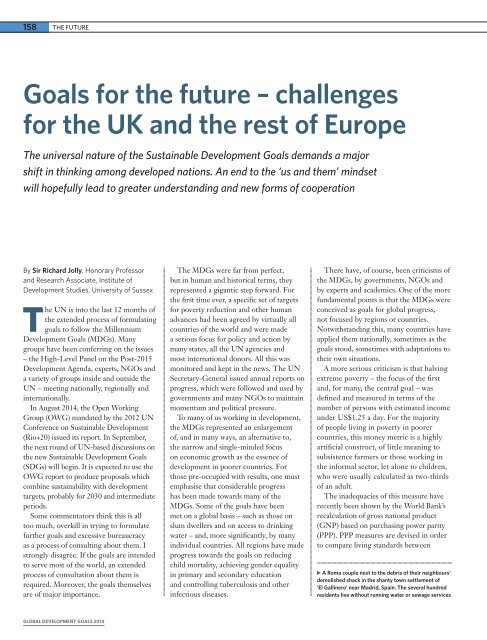FAMBB
FAMBB
FAMBB
Create successful ePaper yourself
Turn your PDF publications into a flip-book with our unique Google optimized e-Paper software.
158 THE FUTUREGoals for the future – challengesfor the UK and the rest of EuropeThe universal nature of the Sustainable Development Goals demands a majorshift in thinking among developed nations. An end to the ‘us and them’ mindsetwill hopefully lead to greater understanding and new forms of cooperationBy Sir Richard Jolly, Honorary Professorand Research Associate, Institute ofDevelopment Studies, University of SussexThe UN is into the last 12 months ofthe extended process of formulatinggoals to follow the MillenniumDevelopment Goals (MDGs). Manygroups have been conferring on the issues– the High-Level Panel on the Post-2015Development Agenda, experts, NGOs anda variety of groups inside and outside theUN – meeting nationally, regionally andinternationally.In August 2014, the Open WorkingGroup (OWG) mandated by the 2012 UNConference on Sustainable Development(Rio+20) issued its report. In September,the next round of UN-based discussions onthe new Sustainable Development Goals(SDGs) will begin. It is expected to use theOWG report to produce proposals whichcombine sustainability with developmenttargets, probably for 2030 and intermediateperiods.Some commentators think this is alltoo much, overkill in trying to formulatefurther goals and excessive bureaucracyas a process of consulting about them. Istrongly disagree. If the goals are intendedto serve most of the world, an extendedprocess of consultation about them isrequired. Moreover, the goals themselvesare of major importance.The MDGs were far from perfect,but in human and historical terms, theyrepresented a gigantic step forward. Forthe first time ever, a specific set of targetsfor poverty reduction and other humanadvances had been agreed by virtually allcountries of the world and were madea serious focus for policy and action bymany states, all the UN agencies andmost international donors. All this wasmonitored and kept in the news. The UNSecretary-General issued annual reports onprogress, which were followed and used bygovernments and many NGOs to maintainmomentum and political pressure.To many of us working in development,the MDGs represented an enlargementof, and in many ways, an alternative to,the narrow and single-minded focuson economic growth as the essence ofdevelopment in poorer countries. Forthose pre-occupied with results, one mustemphasise that considerable progresshas been made towards many of theMDGs. Some of the goals have beenmet on a global basis – such as those onslum dwellers and on access to drinkingwater – and, more significantly, by manyindividual countries. All regions have madeprogress towards the goals on reducingchild mortality, achieving gender equalityin primary and secondary educationand controlling tuberculosis and otherinfectious diseases.There have, of course, been criticisms ofthe MDGs, by governments, NGOs andby experts and academics. One of the morefundamental points is that the MDGs wereconceived as goals for global progress,not focused by regions or countries.Notwithstanding this, many countries haveapplied them nationally, sometimes as thegoals stood, sometimes with adaptations totheir own situations.A more serious criticism is that halvingextreme poverty – the focus of the firstand, for many, the central goal – wasdefined and measured in terms of thenumber of persons with estimated incomeunder US$1.25 a day. For the majorityof people living in poverty in poorercountries, this money metric is a highlyartificial construct, of little meaning tosubsistence farmers or those working inthe informal sector, let alone to children,who were usually calculated as two-thirdsof an adult.The inadequacies of this measure haverecently been shown by the World Bank’srecalculation of gross national product(GNP) based on purchasing power parity(PPP). PPP measures are devised in orderto compare living standards betweenA Roma couple next to the debris of their neighbours’demolished shack in the shanty town settlement of‘El Gallinero’ near Madrid, Spain. The several hundredresidents live without running water or sewage servicesGLOBAL DEVELOPMENT GOALS 2014


